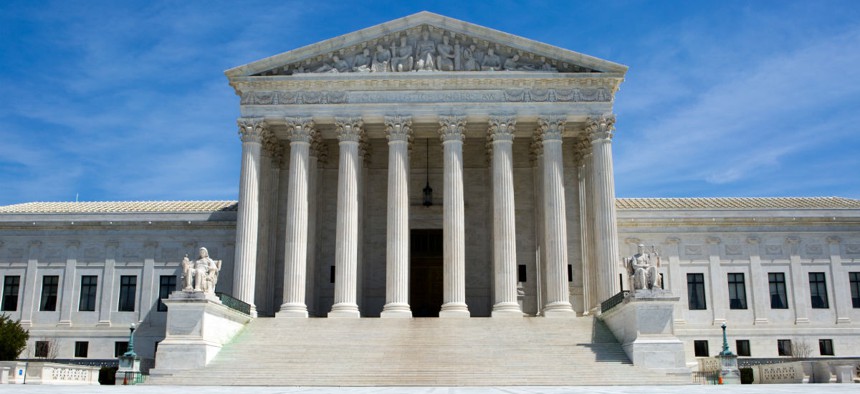Judges' Union: Supreme Court Decision an 'Excuse' to Politicize ALJs
Union is examining all avenues to stop executive order removing ALJs from the competitive service.
The Association of Administrative Law Judges denounced the Trump administration’s recent executive order removing the judges from the competitive hiring process, calling it an effort to politicize a segment of the civil service.
Last week, President Trump signed an executive order moving the hiring of administrative law judges out of the competitive service and into the excepted service, giving agency heads much broader discretion in the judges' qualifications and appointment. White House officials said the edict was a necessity after the Supreme Court ruled in Lucia. v. Securities and Exchange Commission that ALJs are “inferior officers” under the Constitution, and thus subject to the appointments clause of the Constitution.
But AALJ President Marilyn Zahm said that argument does not hold up under scrutiny, and described Lucia as a narrow decision used as an excuse to politicize the administrative law judge corps.
“I do not believe [the Supreme Court decision] is the reason, because I do not see anything in Lucia that mandates this change,” Zahm said. “Lucia does not dictate that you move from the competitive to the excepted service. It simply doesn’t.”
Alan Morrison, the Lerner Family Associate dean for Public Interest and Public Service Law at George Washington Law School, wrote for SCOTUSblog that while the Lucia decision raises questions about the authority of a number of administrative law judges, appeals of Social Security Administration cases would have more of a logistical impact on judges than a legal one. The vast majority of the government’s 1,900 ALJs work at SSA.
“Most of the federal ALJs sit on Social Security Administration cases (over 1,650 out of 1,926), for which it is much less likely that appointments clause objections were preserved, but given the number of cases they have, even a relative few will be bad news for the agency,” Morrison wrote.
Zahm said she suspects the real objective of giving agency heads more discretion in the ALJ hiring process is to make it easier to hire ideologues who are less likely to act fairly and independently.
“Take my agency, the Social Security Administration,” she said. “They could hire candidates who have a certain view of claims under the disability provisions of the Social Security Act, and that the view would be perhaps that claims ought to be denied . . . If I were an American citizen, I would be very concerned that I am no longer guaranteed an independent, impartial administrative law judge to adjudicate my claim against a federal agency.”
Zahm said she also fears that merit systems protections for ALJs against removal or adverse personnel actions, which were preserved in guidance issued by the Office of Personnel Management last week, could only be temporary.
“Despite some assurances from OPM, I don’t see that written into regulations at this point,” she said.
The association is seeking a legal opinion on the executive order, before it takes any formal action to challenge it in court. In the meantime, Zahm said her group is working with lawmakers to try to defund implementation of the order as part of a broader appropriations bill in the House.
On Monday, Reps. Elijah Cummings, D-Md., and Gerry Connolly, D-Va., asked Republicans on the House Oversight and Government Reform Committee to hold a hearing on the executive order.
“We believe the executive order would give politically-appointed agency heads nearly unlimited discretion to stack the ALJ corps with partisan individuals, whose only qualification is they are licensed attorneys,” they wrote. “We request that the committee examine the impact of President Trump’s executive order and explore any alternative, congressionally-directed appointment structures that preserve the integrity of decisions issued by ALJs and ensures ALJs are qualified for their positions.”




